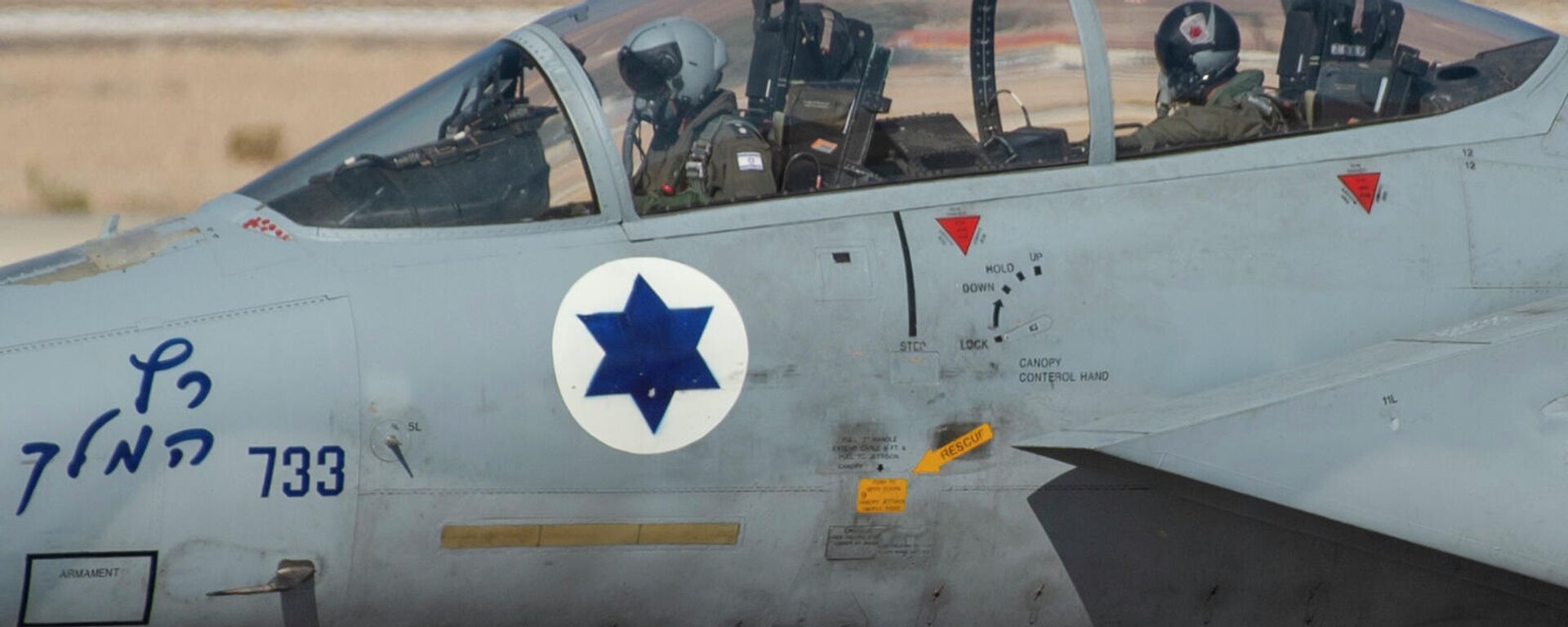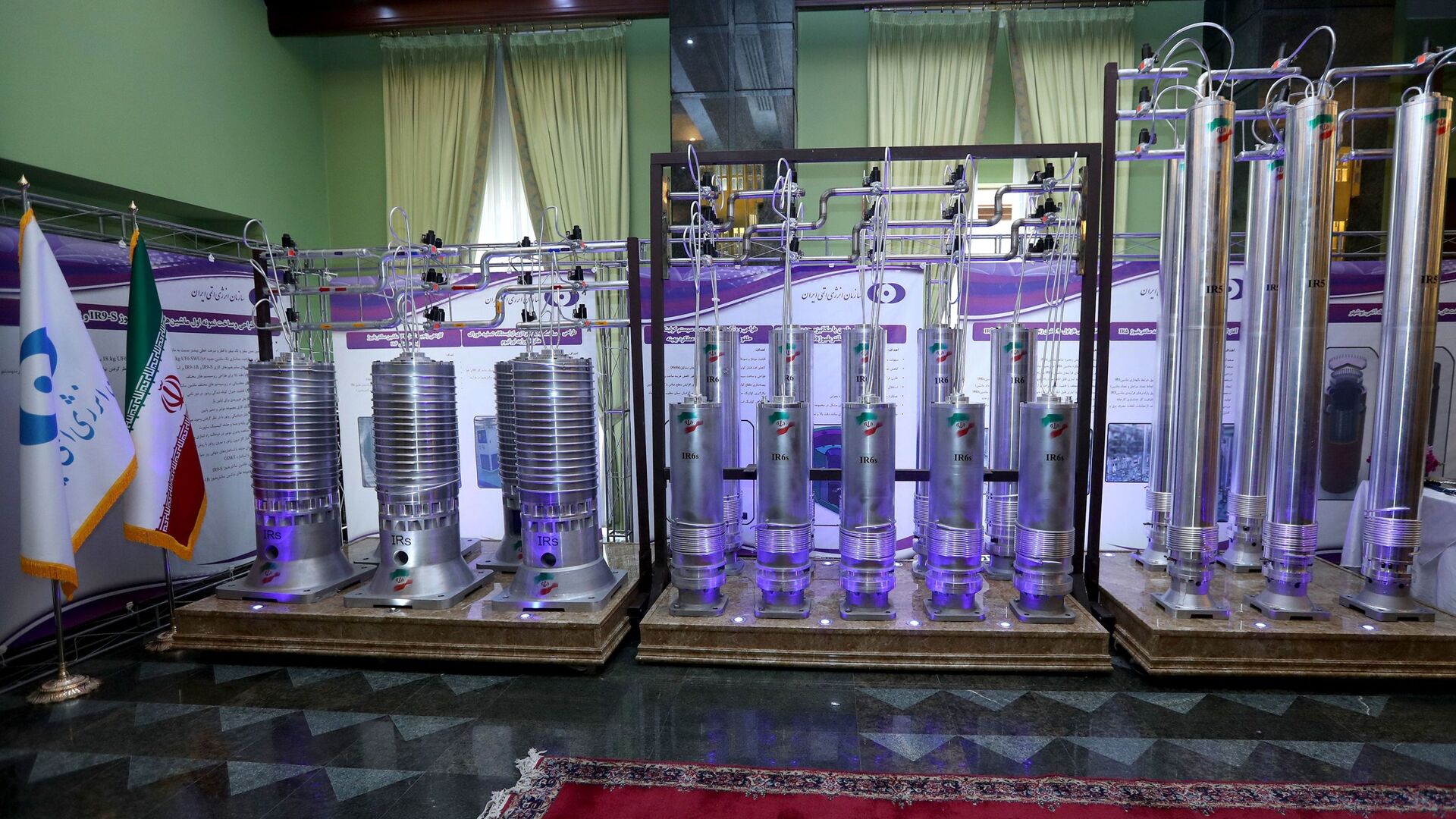https://sputnikglobe.com/20211228/iran-has-no-deterrent-to-its-nuclear-programme-israeli-defence-official-warns-1091863571.html
Iran Has 'No Deterrent' to Its Nuclear Programme, Israeli Defence Official Warns
Iran Has 'No Deterrent' to Its Nuclear Programme, Israeli Defence Official Warns
Sputnik International
The Vienna talks on the possible restoration of the Joint Comprehensive Plan of Action (JCPOA) resumed on Monday after the Christmas holidays, marking the eighth round of the tense negotiations.
2021-12-28T18:02+0000
2021-12-28T18:02+0000
2022-12-07T10:18+0000
middle east
israel
iran
joint comprehensive plan of action (jcpoa)
nuclear deal
nuclear weapons
https://cdn1.img.sputnikglobe.com/img/07e5/04/1a/1082726191_0:160:3073:1888_1920x0_80_0_0_1e90c35a0e585e60c0fc99e05fadd1ad.jpg
The Iranian nuclear programme does not have any kind of deterrent that would be able to stop it, a senior Israeli defence official has claimed.As Tehran, having stepped away from its JCPOA commitments after Donald Trump's exit from the deal in 2018, continues to enrich uranium up to 60%, far beyond the limits allowed under the accord, Palti said that "we don’t want to reach a point where we will have to ask ourselves how Iran was allowed to enrich to 90% [a weapon production enrichment level]".Tehran proceeded to boost enrichment to 60% after its calls for European countries to leverage the United States to save the JCPOA agreement were met with silence. The Islamic Republic, however, outlined that this level of enrichment is only used for civilian purposes, adding that it will not pursue weapons-grade 90% enrichment even if the Vienna talks fail.US Special Envoy to Iran Rob Malley said that the US does not intend to "agree to a worse deal because Iran has built up its nuclear programme". The Vienna negotiators have to address the Iranian nuclear programme as soon as possible, he said, because at some point efforts to revive the JCPOA would “be tantamount to trying to revive a dead corpse”.Should the negotiations fail and not restore the nuclear deal, it is “more than plausible, possible, and maybe even probable” that Iran will try to become a threshold nuclear state, The New Yorker said, citing a senior State Department official.'We Will Act Alone'Among those who are vehemently opposed not only to Iran obtaining nuclear weapons, but even the idea of a restoration of the JCPOA, is Israel. As the Vienna talks resumed on Monday, Israeli Foreign Minister Yair Lapid asserted that his country's "main foreign policy and security issues are to prevent the Iranian nuclear programme".Earlier in December, the United States and Israel agreed that Iran's "rapidly advancing" nuclear programme, along with the "destabilising activities and support for terrorist proxy groups", poses a "grave threat" to peace in the region. Tehran, however, has repeatedly said that it does not have plans to develop nuclear weapons, even after stepping away from its JCPOA commitments. According to the Islamic Republic, it is up to the United States to take the first steps towards reviving the nuclear deal abandoned by the 45th president, starting with lifting the harsh sanctions imposed by Trump under his "maximum pressure" campaign.Iran also blasted the "double standards" in regard to nuclear weapons in the Middle East, pointing to the fact that while the West threatens dire consequences for Tehran over its nuclear programme, it does not do the same when it comes to Israel - a country that is presumed to possess nuclear weapons. Israel is also among those countries that have not signed the 1970 Nuclear Non-Proliferation Treaty, joined by Pakistan, India and North Korea.
https://sputnikglobe.com/20211222/israel-could-attack-irans-nuclear-programme-tomorrow-if-needed-says-air-force-future-head-1091726758.html
israel
iran
Sputnik International
feedback@sputniknews.com
+74956456601
MIA „Rosiya Segodnya“
2021
News
en_EN
Sputnik International
feedback@sputniknews.com
+74956456601
MIA „Rosiya Segodnya“
Sputnik International
feedback@sputniknews.com
+74956456601
MIA „Rosiya Segodnya“
vienna talks, jcpoa negotiations, restoration of the jcpoa, nuclear talks with iran, iran's nuclear program,
vienna talks, jcpoa negotiations, restoration of the jcpoa, nuclear talks with iran, iran's nuclear program,
Iran Has 'No Deterrent' to Its Nuclear Programme, Israeli Defence Official Warns
18:02 GMT 28.12.2021 (Updated: 10:18 GMT 07.12.2022) The Vienna talks on a possible restoration of the Joint Comprehensive Plan of Action (JCPOA) resumed on Monday after the Christmas holidays, marking the eighth round of the tense negotiations.
The Iranian nuclear programme does not have any kind of deterrent that would be able to stop it, a senior Israeli defence official has claimed.
“The problem with Iran’s nuclear programme is that, for the time being, there is no diplomatic mechanism to make them stop”, Zohar Palti, who heads the Israeli Defence Ministry’s political-military bureau, told The New Yorker. "There is no deterrent. Iran is no longer afraid".
As Tehran, having stepped away from its JCPOA commitments after Donald Trump's exit from the deal in 2018, continues to enrich uranium up to 60%, far beyond the limits allowed under the accord, Palti said that "we don’t want to reach a point where we will have to ask ourselves how Iran was allowed to enrich to 90% [a weapon production enrichment level]".
Tehran proceeded to boost enrichment to 60% after its calls for European countries to leverage the United States to save the JCPOA agreement were met with silence. The Islamic Republic, however, outlined that this level of enrichment is only used for civilian purposes, adding that it will not pursue weapons-grade 90% enrichment even if the Vienna talks fail.
US Special Envoy to Iran Rob Malley said that the US does not intend to "agree to a worse deal because Iran has built up its nuclear programme". The Vienna negotiators have to address the Iranian nuclear programme as soon as possible, he said, because at some point efforts to revive the JCPOA would “be tantamount to trying to revive a dead corpse”.
Should the negotiations fail and not restore the nuclear deal, it is “more than plausible, possible, and maybe even probable” that Iran will try to become a threshold nuclear state, The New Yorker said, citing a senior State Department official.
“We’ve seen Iran’s nuclear programme expand, and we’ve seen Tehran become more belligerent, more bellicose in its regional activities”, Malley said. “They are miscalculating and playing with fire”.
Among those who are vehemently opposed not only to Iran obtaining nuclear weapons, but even the idea of a restoration of the JCPOA, is Israel. As the Vienna talks resumed on Monday, Israeli Foreign Minister Yair Lapid asserted that his country's "main foreign policy and security issues are to prevent the Iranian nuclear programme".
"We have told everyone clearly that Israel will not let Iran become a nuclear threshold state. Of course, we prefer to act in international cooperation, but if necessary we will act alone for our security", he stated.

22 December 2021, 17:37 GMT
Earlier in December, the United States and Israel agreed that Iran's "rapidly advancing" nuclear programme, along with the "destabilising activities and support for terrorist proxy groups",
poses a "grave threat" to peace in the region.
Tehran, however, has repeatedly said that it does not have plans to develop nuclear weapons, even after stepping away from its JCPOA commitments. According to the Islamic Republic, it is up to the United States to take the first steps towards reviving the nuclear deal abandoned by the 45th president, starting with lifting the harsh sanctions imposed by Trump under his "maximum pressure" campaign.
Iran also blasted the "double standards" in regard to nuclear weapons in the Middle East, pointing to the fact that while the West threatens dire consequences for Tehran over its nuclear programme, it does not do the same when it comes to Israel - a country that is presumed to possess nuclear weapons.
Israel is also among those countries that have not signed the 1970 Nuclear Non-Proliferation Treaty, joined by Pakistan, India and North Korea.




